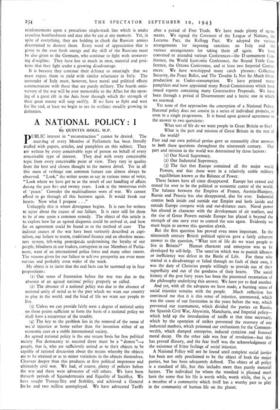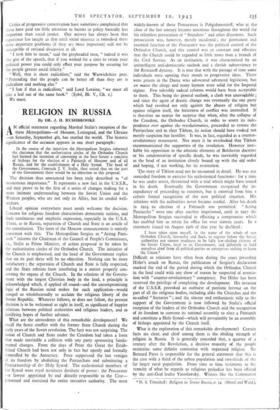A NATIONAL POLICY : I
By QUINTIN HOGG, M.P.
conceivable type of interest. They deal with every conceivable topic from every conceivable point of view. They vary in quality. from the best and closest thought to the merest drivel. Yet in all this mass of verbiage one common feature can almost always be observed. " Look," the writer seems to say in various tones of voice, " Look where we have got to as the result of our handling of affairs during the past five and twenty years. Look at the monstrous evils of peace.' Consider the multitudinous woes of war. We cannot afford to go through all this business again. It would break our hearts: Now what I propose . . ."
Unhappily this is where divergence begins. It is rare for writers to agree about the causes of our failure. It is rarer still for them to be of one upon a common remedy. The object of this article is to explore how far an agreed diagnosis could be arrived at, and how, far an agreement could be found as to the method of cure The indirect causes of the war have been variously described as capi- talism, our failure to rearm, traditional finance and an obsolete mone- tary system, left-wing propaganda undermining the loyalty of our people, blindness in our leaders, corruption in our Members of Parlia- ment, want of an international police force and many other causes. The reasons given for our failure to achieve prosperity are even more various and probably even wider of the mark.
My object is to insist that the real facts can be summed up in four propositions: (t) Our sense of frustration before the war was due to the absence of an aimed national policy properly so called.
(2) The absence of a national policy was due to the absence of national unity of mind as to the part which we want our country to play in the world, and the kind of life we want our people to live.
(3) Unless we can provide fairly soon a degree of national unity on these points sufficient to form the basis of a national policy we shall have a recurrence of the trouble.
(4) The key to the problem lies in the removal the sense of social injustice at home rather than the invention either of an economic cure or a stable international society.
An agreed national policy is the one secure basis for free political society For democracy to succeed there must be a "demos "—a people, that is, who are sufficiently united as to their objects to be capable of rational discussion about the means whereby the objects are to be attained or as to minor variations in the objects themselves. Cleavage deeper than this produces at first political impotence and ultimately civil war. We had, of course, plenty of policies before the war and there were advocates of still others. We have been through periods of Squandermania and Equality of Sacrifice. We have sought Tranquility and Stability, and achieved a General Suite and two million unemployed. We have advocated Tariffs
after a period of Free Trade. We have made plenty of agree- ments. We signed the Covenant of the League of Nations, the
Locarno Pact, the Kellogg Pact. We adopted the various arrangements for imposing sanctions on Italy and the various arrangements for taking them off again. We have convened or attended various Conferencesthe D.sarmament Con- ference, the World Econoniic Conference, the Round Table Con- ference, the Ottawa Conference, and at least two Imperial Confer- ences. We have worshipped many catch phrases: Collective Security, the Peace Ballot, and The Trouble Is Not So Much Over- production as Under-consumption. We have printed many pamphlets and have appointed many Royal Commissions which have issued reports containing many Constructive Proposals. We have been through a period of Disarmament and a hectic one in which we rearmed:
Yet none of this approaches the conception of a National Policy. National policy does not consist in a series of individual projects, or even in a single programme. It is based upon general agreement to the answer to two questions:
What sort of life do we want people in Great Britain to live? What is the part and mission of Great Britain in the rest of the world?
Fate and our own political genius gave us reasonably clear answers to both these questions throughout the nineteenth' century. Our part and mission in the world was determined by three factors: (t) Our Naval Supremacy.
(2) Our Industrial Supremacy.
(3) The fact that Europe contained all the- major world Powers, and that these were in a relatively stable military equilibrium known as the Balance of Power.
These factors have all since disappeared. Europe has ceased and ceased for ever to be the political or economic centre of the world. The balance between the Empires of France, Austria-Hungary, Russia and Prussia has also disappeared, also for ever. Industrial centres both inside and outside our Empire and both inside and outside Europe compete with and out-distance ours. Naval power has altered in character with the development of air warfare, and the rise of Great Powers outside Europe has placed it beyond the strength of one navy ever to control the seas again. Evidently we must begin to answer this question afresh. ,
But the first question has proved even more important. In the nineteenth century British political opinion gave a fairly coherent answer to the question, " What sort of life do we want people to live in Britain?" Human character and enterprise was to be developed by self-help. The sanction which was to punish idleness or inefficiency was defeat in the Battle of Life. For those who started at a disadvantage or failed through no fault of their own, it was the duty of Christian people willingly to provide out of their superfluity and out of the goodness of their hearts. The social history of the past forty years has been the piecemeal recantation of the philosophy underlying this answer. We have yet to find another.
And yet, with all the advances we have made, a burning sense of social injustice remains with the people. Much reflection has convinced me that it is this sense of injustice, unremoved, which was the cause of our frustration in the years before the war, which prevented our rearmament, which divided the parties on Russia, the Spanish Civil War, Abyssinia, Manchuria, and Imperial policy— which held up the introduction of tariffs at that time necessary, which by the operation of strikes prevented the recovery of our industrial markets, which poisoned our enthusiasm for the Common- wealth, which damped enterprise, induced cynicism and fostercd moral decay. On the other side was fear of revolution—but this has proved illusory, and the fear itself was the acknowledgment of the existence of bitter feelings of social injustice.
A National Policy will not be found until complete social justice has been not only proclaimed to be the object of both the major parties, but has been adequately defined. The object of all policy is a standard of life, .but this includes more than purely material factors. The individual for whom the standard is planned must have the sense that his life is worth while, worth while, that is, as a member of a community which itself has a worthy part to play in the community of human life on the planet.
Critics of progressive conservatism have sometimes complained that these have paid too little attention to factors in policy basically less important than social justice. Our answer has always been that experience has taught us that uotil social injustice is remedied these more important problems (if they are more important) will not be susceptible of rational -discussion at all.
" I took him to mean," said the greyheaded man, " indeed it was the gist of the speech, that if you wished for a time to retain your political power you could only effect your purpose by securing for the people greater social felicity."
" Well, that is sheer radicalism," said the Warwickshire peer. " Pretending that the people can be better off than they are is radicalism and nothing else."
" I fear if that is radicalism," said Lord Loraine, " we must all take a leaf out of the same book." (Sybil, Bk. V., Ch. I.)
We must.



























 Previous page
Previous page